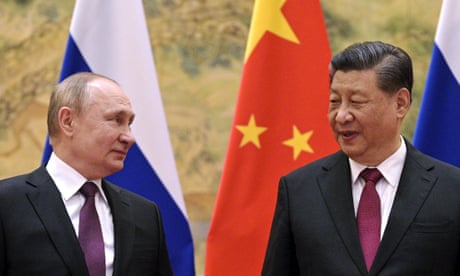- by foxnews
- 08 Apr 2025
China is squirming under pressure to condemn Russia. It can’t hold out forever | Richard McGregor
China is squirming under pressure to condemn Russia. It can’t hold out forever | Richard McGregor
- by theguardian
- 12 Mar 2022
- in news

Two weeks into Russia's invasion of Ukraine, and China is still turning diplomatic cartwheels to prevent the war from damaging its global standing, while still preserving its strategic partnership with Moscow.
China offers to mediate! China offers aid! China is "extremely concerned" about the safety of citizens! Xi mentions the word "war"!
The plethora of headlines alone is evidence for how Beijing has been subtly shifting its language day-to-day to put some distance between itself and Moscow and its increasingly bloody military tactics.
But for the moment, such protestations should be ignored. Beijing's core message, especially the one tailored for its domestic audience and Moscow itself, is that it is standing by Russia, or perhaps more the point, against the US, which it continues to blame for the war.
If there was ever any doubt as to Beijing's authentic view, Zhao Lijian, the foreign ministry spokesperson and the most prominent voice of China's "wolf warrior" diplomacy, provided it this week.
Zhao attacked the US for secretly operating biological weapons labs in Ukraine. In doing so, he was echoing a conspiracy theory from Russia, for which there has been no evidence offered.
Throughout, Beijing has not backed away from its core position, that Moscow has "legitimate security interests" in Ukraine. And like Moscow, state media in Beijing has labelled the US "an empire of lies".
Still, there is little doubt that Beijing is squirming under pressure, not just from the US, but also from Europe, Japan and Australia, to condemn the invasion.
As Evan Feigenbaum, a former US government official and now head of the Carnegie Endowment for International Peace, a Washington thinktank, observed, Beijing is struggling to settle on a clear message for the simple reason that it is trying to reconcile the irreconcilable.
Beijing simultaneously wants to preserve its partnership with Moscow, stand by its longstanding policy of territorial integrity and non-interference in other states, and avoid being collateral damage in the war.
"The more China leans to Moscow, the more it paints a target on its back for Washington and Brussels on the sanctions," Feigenbaum said in the SupChina podcast. "Obviously, facts on the ground in Ukraine flatly contradict anything the Chinese government would like to say about respect for sovereignty and territorial integrity."
Beijing doesn't welcome the conflict and appears to have been taken aback by Vladimir Putin's full throttle invasion, even though the Russian leader met with Xi Jinping days before the tanks headed across the border.
Xi has been bedding down his own political system in readiness for the once-every-five-years Communist party congress at the end of the year, at which he is expected to seek a norm-busting third term.
Xi neither needs nor wants any instability at such a sensitive moment. His many enemies have learned to shut their mouths in recent years lest they feel their leader's wrath.
But if the situation deteriorates in Ukraine and the conflict slides into a full-blown insurgency, Xi's critics will have a stick to beat him with.
After all, Xi and Putin have met nearly 40 times since 2012. For Xi not to have read the room and realised that Putin was readying a full invasion represents a failure on his part, and that of the Chinese system.
Why then is Beijing standing by Moscow?
It is important to remember that the "no limits" partnership signed in early February between the two leaders in Beijing was the culmination of a relationship two decades in the rebuilding.
It is an unsentimental partnership but not a flash in the pan, and one which both countries have judged holds great value on multiple levels.
Russia exports arms, energy and farm products, such as wheat, to China. China sends consumer goods in the other direction.
Most importantly, both have an overriding interest in hobbling US power around the world, and in the European and Asian spheres in particular.
Over time, Chinese support for Russia in Ukraine could be matched by Russian support for China in any crisis with Taiwan.
They have already been running a parallel diplomatic strategy for years, according to which China allows Russia to take the lead in the Middle East, while Moscow buttresses Beijing in Asia.
But the relationships has its pitfalls. Russia is by far the junior partner to a much larger China, the reverse of when the two countries were revolutionary comrades-in-arms in the 1950s.
Beijing, for its own part, is finding itself hitched to a highly aggressive and unstable Russian leader, with little apparent ability to influence his actions.
Beijing has also been courting Europe to split it from the US, with some success. Its position on Ukraine has instead sent this initiative into reverse, prompting renewed transatlantic bonding and demands from Brussels and other capitals that China withdraw support from Russia.
If the conflict is still raging in six months, Beijing might not settle for a subtle re-positioning. Instead of taking fire for Moscow, it might start thinking of ways to put pressure on it as well.
- by foxnews
- descember 09, 2016
Ancient settlement reveals remains of 1,800-year-old dog, baffling experts: 'Preserved quite well'
Archaeologists have recently unearthed the remarkably well-preserved remains of a dog from ancient Rome, shedding light on the widespread practice of ritual sacrifice in antiquity.
read more


